Lisa Borton brings inspiration, creativity to the UM-Flint Theatre stage
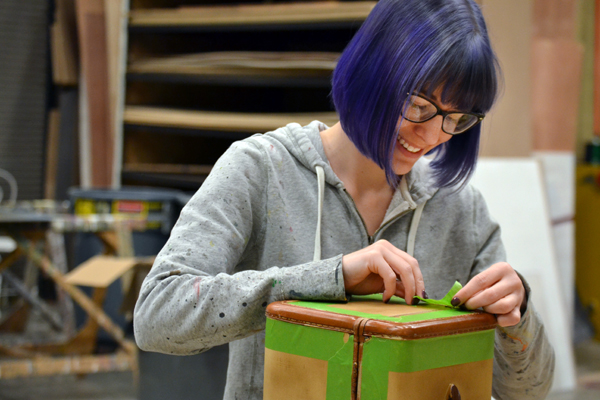
Lisa Borton wrapped up the 2017-18 university theatre season by acting as both scenic designer and costume designer for UM-Flint Theatre's Lend Me a Tenor. "On a professional level, it's a culmination of the last decade of work," said Borton, referencing her roots in costume design and transition to scenic design during her career. "Marrying those two areas and being able to do it fairly seamlessly is my own personal justification that I really do know how to do both of those things."
Borton, a Lecturer IV faculty member in the UM-Flint Theatre and Dance Department, earned her BA from Hope College in 2009 and her MFA from the University of Iowa in 2012. At UM-Flint, she currently teaches Introduction to Theatre Design, Research Methods for Theatre Design, Scene Design, Scene Painting, Computer-Aided Design, and Properties Design.
Additionally, Borton works professionally in the region. In the last year she has served as Scenic Designer for Flint Youth Theatre's Akeelah and the Bee, costume designer for Hope Summer Repertory Theatre's Annie, and as scenic designer for Tipping Point Theatre's Boeing Boeing. She is also a member of the Guild of Scenic Artists.
The Path to a Creative Career
"I grew up singing and acting and I realized that my favorite part was when we got our costumes," reflected Borton, when asked how she fell in love with her field. "Though it didn't occur to me until midway through undergrad that that was actually a profession. I took a costume design class and I was hooked."
"Scenic design came later," she continued. "A lot of the principles and ideas are the same, but instead of thinking about what someone's wardrobe might consist of, you start thinking about what things they surround themselves with. I like the feeling that the set/space existed long before the curtain opened."
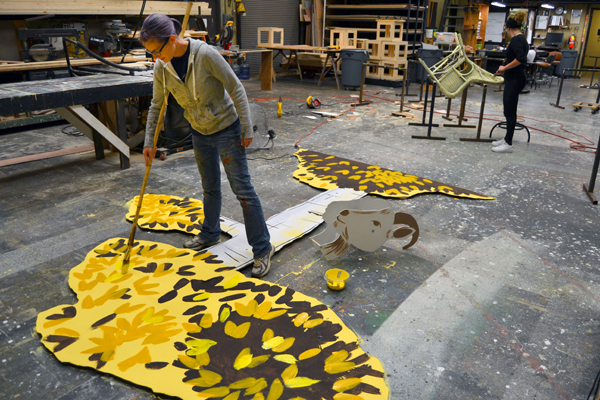
Borton has been with UM-Flint Theatre for six years. "During that time I do feel like I've gotten to know myself better as a designer and as an instructor," she noted. "I'm more comfortable in my own skin standing in front of the classroom, particularly when I think about it as sharing ideas rather than lecturing."
Theatre Design & Technology student Sarah Briggs has found a mentor and instructor in Borton. "Lisa Borton has been an integral part of my own student success here at UM-Flint. She challenges me to learn from what I do and to apply those lessons to make even greater works," said Briggs. "Lisa is not condescending or negative; she also doesn't put up with self-deprecating actions. Lisa has a keen eye for underutilized potential in students and uses her knowledge and experience to help guide our theatre students to new successes."
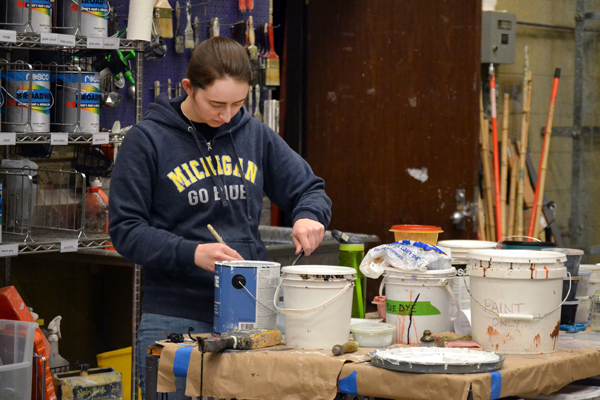
"She inspired and challenged me to make my capstone a part of Tenor's design," continued Briggs. "It is such a pleasure to work with her and see how hard she works towards her goals."
Borton is conscious of the role she can play in students' academic and professional careers, especially in her non-traditional position. "Scenic designers historically have been predominantly old white dudes—probably has something to do with masculinity and power tools and math," Borton said. "It's so fulfilling to see that mentality start to shift. I have just as many female students as male students who have an interest in scenic design."
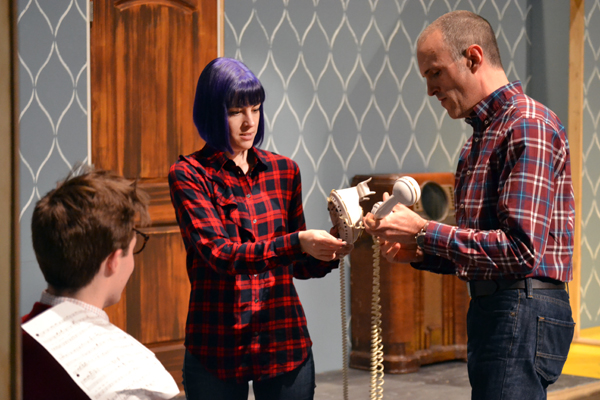
"The professor I most identified with in undergrad was the female costume designer, so I really never envisioned myself doing anything else," Borton added. "It wasn't until graduate school when my scenic professor was absolutely encouraging of whoever had a slight interest in scenic design to be a scenic designer. I want to enable my students to find their path or niche, regardless of who has walked that path before—or if it's brand new."
Inspiring Artists in UM-Flint Theatre
The UM-Flint Theatre and Dance Department is committed to providing their students with access to a wide variety of experiences, both on and off stage. As part of UM-Flint's College of Arts and Sciences, the liberal arts foundation of the university, the department knows the value in building skills outside of one's specific major.
"I've spent a lot of time with my students this semester talking with professionals in the field, including a few alumni," said Borton. "What I've been hoping to instill in my students during these talks is that it isn't about being the most talented designer—that can only get you so far. What comes up again and again in conversations about hiring in professional theatre or through our alumni is that if you're a lovely human to work with, you're going to get hired."
"So much of this career is about communication and being a go-getter, so those 'soft skills' are so important. I hope that at the end of their time here they understand how important that is."
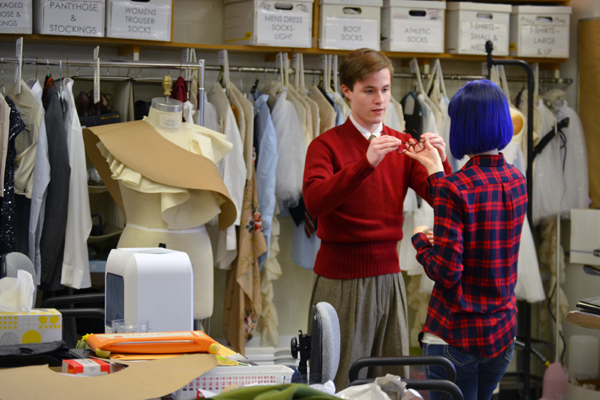
Borton also hopes to pass along some of the lessons she's learned the hard way. "I hope I teach them to not take themselves or their work too seriously, and what I mean by that is that in the arts it can be really easy to tie your heart and soul into the work, but often times you're going to work with a director who doesn't like what you've produced, or wants you to alter it," explained Borton. "It's a really collaborative art form. In those situations you can feel a little crushed."
"I think learning to separate yourself from what you've created and to remember that you're going to create a hundred more (at least) and probably work on the same show more than once is imperative to wanting to keep working in theatre."
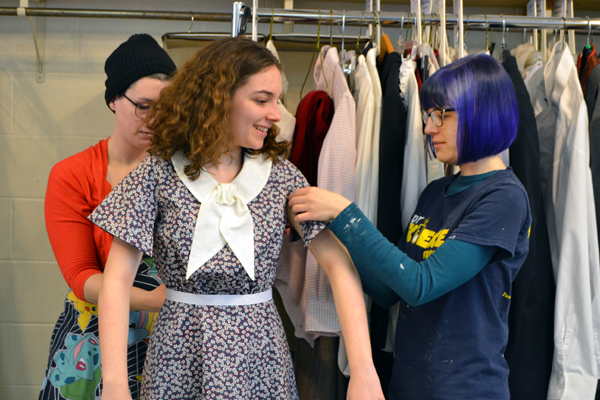
For Briggs, a senior, the lessons have definitely been absorbed. "Since day one of working with Lisa she has always been an influence on me. She is very knowledgeable in different techniques in art and she has a keen eye in design. As my professor, Lisa is both very patient and very encouraging. This art field is not about being perfect 100% of the time, and especially not on the first try. Lisa has taught me that to make it in this business, you have to be willing to get into the work and just try your best."
Briggs has also gained some more personal insight from her time working with Borton. "I, personally, am prone to being very much a perfectionist and tend to second-guess my work or choices, and as a student that can be very challenging to work through alone. Lisa could always see me when I was trying to hide my struggles, and she helps me work through problems creatively."
A Part of UM-Flint
UM-Flint Theatre and Dance productions and courses are open to all majors, not just those in the department. So Borton has the chance to interact with students from across the university. "UM-Flint students are some of the hardest working students I've encountered," she said. "They're balancing 12 credits, a couple part-time (or full-time) jobs, parenting, being caretakers of their own parents, etc. etc. etc. It's made me be more empathetic to real life situations, which I greatly appreciate. The tenacity of these students is amazing and inspiring."
For those who are a part of her department and pursuing a career in theatre, Borton considers the lifelong impact her courses can have. "I try to give my students opportunities for growth. Some students naturally find their niche or their technical skill, which is often where the jobs are in professional theatre, but sometimes it takes a little more work," she noted.
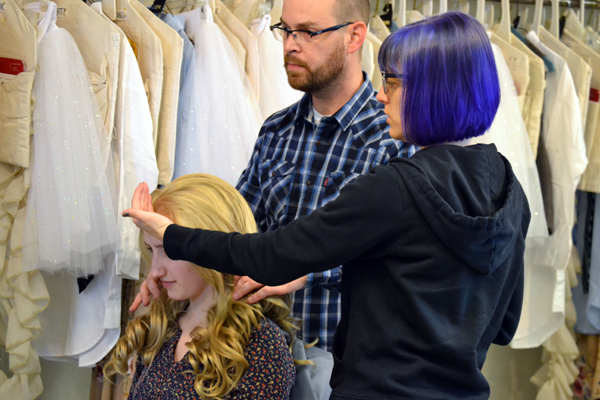
"I try to help my students find class and production opportunities that will excite them and help them find what they're passionate about. It's a rare student who goes through our program without having some sort of specialty, and when they graduate I want them to be able to say, 'I'm a carpenter' or 'I'm a scenic artist' and be able to pursue those types of positions confidently."
Borton also continues to pursue her passion for learning new skills, knowing that they'll affect her own growth as an artist and an educator. "I've recently been pestering Doug Mueller (UM-Flint Theatre Technical Director, Resident Lighting Designer, and faculty lecturer) about teaching me about lighting design," she said. "I try to attend as many scenic painting conferences as I can because it's fun to learn new techniques. I also take art classes when I have time—I've done glassblowing, pottery (which I'm terrible at), and last year I took a metalsmithing class which I adored and now own my own small jewelry business."
"It's so important for me as a theatre artist to have another outlet, particularly one that doesn't require as much collaboration as theatre design," continued Borton. "It gives me more ownership, more room to explore and experiment with things that I might not otherwise try. The more things you know, the more experiences that you have to draw on when it's time to create a design for a show—traveling, museum visits, art, magazines, books, etc. they're all part of that experience."
Related Posts
No related photos.
UM-Flint News
The Office of Marketing & Communications can be reached at mac-flint@umich.edu.